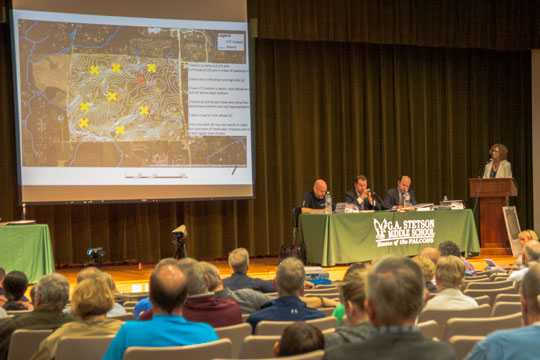The ninth session of a conditional use hearing for the Toll Bros.-proposed development of Crebilly Farm at Routes 926 and 202 in Westtown Township turned into he-said-she-said testimonies over stormwater management. That came after supervisors denied a witness who would have testified about battlefield preservation via video conferencing.
Also testifying during the Oct. 24 session was James Scanlon, superintendent of the West Chester Area School District.
Attorney Mark Thompson, representing Neighbors for Crebilly, called civil engineer Michele Adams to testify about perceived flaws in the stormwater management plan proposed by Toll. She said the stormwater management plan shown on the conditional use application for the 317 new homes is insufficient and that it fails to meet best practices and codes.
According to Adams, the nine basins shown on the plan are not in the best locations for infiltration and that there are insufficient testing data to show that infiltration would happen properly. She said some of the tests were done away from the proposed basins.
Additionally, Adams said load ratios were excessive. Load ratios, she explained later, is the ratio between the size of a basin and amount of land from which the basin accepts the runoff. As an example, she said a 1-acre basin accepting runoff from 5 acres of land has a load ratio of 5-1.
In her testimony, she said some load ratios based on what's shown on the plan indicate load ratios more than 120-1.
"What they're proposing is inadequate," she said. "There would be more water than the soil can handle at one time."
Adams said the stormwater plan shown would result in excessive runoff and that public health, safety, and welfare would not be protected, nor would water quality be protected.
The excessive runoff would also hurt aquatic life because of chemicals in lawn fertilizers. Specifically, Adams said insect larva would be placed in jeopardy, that there would be increased algae growth and soil erosion downstream as well as adding silt to the water, which would affect the quality of drinking water in Wilmington.
In response to Adams' testimony, Toll's attorney Greg Adelman called Jeff Madden as a rebuttal witness. Madden testified on the stormwater management plan in February.
Tuesday night he repeated the thrust of his earlier testimony, saying the nine proposed basins would handle stormwater adequately, that all water would drain within three days after a storm as it's supposed to.
Also in February, he said the future homeowners' association would be responsible for maintaining the basins and that the basins would continue to function properly even if maintenance was lax.
Madden acknowledged some of Adams' points but said the system shown was only conceptual, that it would be further developed and tested later as the plan was engineered during the land use process of the application.
Among the acknowledgments was that some of the load ratios were high, but he said that was OK during the conceptual or rudimentary phase for the conditional use plan.
The audience snickered during his cross-examination when he was asked whether a load ratio of more than 120-1 was acceptable. Madden said it was OK at the conceptual level, but on further questioning said he's never seen environmental protection agencies approve a load ratio greater than 30-1 or 40-1.
He also acknowledged that some of the basin testing was not done at the specific location of the proposed basins, but in "the general vicinity." That, too, he said was acceptable at this point because further testing would be done as the plan is developed.
Madden added that some of the testing was done at the top of a proposed basin, but added that even the bottom of the basins were higher than seasonal high-water levels, and he affirmed that testing for infiltration meets requirements for the conceptual stage.
After Adams and Madden testified, West Chester Area School District Superintendent James Scanlon formally presented a resolution that the school board passed earlier this year. That resolution asks Westtown Town to levy an impact fee on Toll of $645,000 per year for five years. Using Toll’s own impact assessment study, he said the proposed 317-home development would cost the district an annual loss of almost $129,000 because it would add 172 new students.
He estimates the extra students would cost the district between $2.3 million and $2.4 million, while the anticipated sustainable revenue from the development is $1.8 million.
Scanlon said the district is asking the township to levy the impact fee because state law prevents a school district from imposing such fees on a developer, but municipalities may do so.
The evening’s session began with the Board of Supervisors disallowing testimony from a military historian because he would have testified via video from the United States Military Academy at West Point.
Samuel Watkins is a history professor at the academy and an editor for The West Point History of the Civil War, The West Point History of the American Revolutionary War and a volume editor for The West Point History of Warfare. The board denied the testimony because it would not be in person.
In lieu of that testimony, Thompson called J. Michael Miller, also a military historian and historian emeritus for the United States Marine Corp.
Miller gives “staff rides” to commissioned and non-commissioned officers. He takes those military personnel through various battlefields, and asks them to apply what they see at those battlefields to today’s military tactics. He said it makes them think.
Preserving battlefields is an important part of their ongoing education because they function as classrooms.
The next session is scheduled for 6 p.m. Monday, Nov. 27 at Rustin High School. According to township solicitor Patrick McKenna, the proceedings that night would focus on public comment.
About Rich Schwartzman
Rich Schwartzman has been reporting on events in the greater Chadds Ford area since September 2001 when he became the founding editor of The Chadds Ford Post. In April 2009 he became managing editor of ChaddsFordLive. He is also an award-winning photographer.


Comments